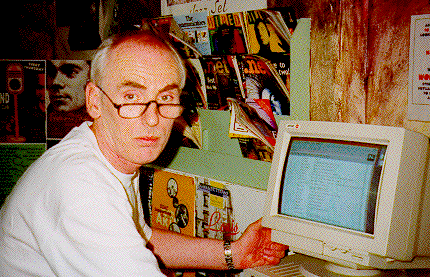View from the Hill: Internet Cafes
So what is an Internet café anyway? Most of us have heard of them, but how many have actually ventured in? The very idea seems incongruous at best, totally nerdish at worst. Those of us who have experience of controlling library environments will wince at the very idea. Cappuccino and baguettes at the keyboard? What about spillages? What about crumbs? What about the incessant distraction of slurping and chewing? Quite clearly – our own offices excepted, of course – these conditions are quite impossible for serious intellectual endeavour.
Web13 is one of Edinburgh's three Internet cafés. "We were the first one in Edinburgh" remarks owner Ian McCarron, "though Cyberia dispute that" he adds ruefully. Café Cyberia, which owns a chain of Internet cafés, also opened a place in Edinburgh in the spring of 1995. The argument over who opened first is only one of several sources of rivalry existing between the two establishments. A third café, Electric Frog, poses a more recent threat.
It is Festival time in Edinburgh, McCarron is proud of the fact that Web13 is the official Web host for the Festival Fringe. "You can book a ticket for an event on the site" he remarks, clicking through the relevant pages. "Or post your own theatre review. I've read some excellent reviews recently - though it turned out that some of them had been written by the actors themselves between performances…."
What leads someone to start an Internet café? Does the Internet come first, or is it the other way round?

"Web13 was conceived as an Internet café from the start" remarks McCarron. "Computing had been a growing interest of mine for years. When I first heard the concept of Internet cafés, something clicked into place. I gave up my job in HIV research, scraped up some start-up capital, and went for it." The going was not easy however. Edinburgh City Council was perplexed by the hybrid nature of the establishment, and delayed the issue of a licence.
McCarron's luck changed, however, when he managed to convince the organisers of the 1995 Science Festival in Edinburgh to allow him to transport his concept to the Science Dome. Scotland's national Sunday broadsheet, Scotland on Sunday, provided sponsorship. Publicity was generated, and the press became intrigued. "We were accepted" recalls McCarron, with a grin.
Other battles remained to be fought. McCarron first wanted to call his new venture "Netcafé", but was prevented by an injunction taken out on behalf of the food giant in Switzerland. As for the competition from the other cafés? "Let's just say that the real Internetters come here" says McCarron conclusively. "Our PCs run UNIX."
By 11.30 am the place is filling up. The front of the shop is laid out as a conventional café, with counter, tables with flowers, and arty posters on the walls. The PCs, printers and scanner are all located in the rear of the premises. "We found that having PCs at the front was intimidating people" remarks McCarron. "They'd see the blackboard outside, decide to come in for a cappuccino and a cake, then notice the PCs and think they'd made a mistake. Now they come in for a cappuccino, notice people perched at the PCs in the rear section, and gradually gather the confidence to take the plunge."
So who uses the PCs? Can there be any serious use, with bistro-style food being served all around, and music playing continuously (each PC is named after a dead rock star). "We do aim for the informal end of the market" states McCarron. "But you might be surprised. We've had the Chamber of Commerce in for an Internet familiarisation event. And business people frequently drop by to check their e-mail." Any regulars? "Oh yes. Some people get hooked. We have the Doom players and the Chatters, of course. But serious regulars too." He nods towards an intense keyboard-basher in the corner. "He's an American journalist reporting on the Festival. He's in for hours every day. "
What about students? Edinburgh now boasts three universities, a college of Higher Education and other colleges. "They usually only come in if they are desperate" replies McCarron. "The fact is that the facilities at their institutions are better than we can offer, and don't cost them anything. We get a fair amount of use from overseas students in the summer." Some students are actually employed by McCarron to do HTML work, building up the café's own Web site.
This is the other side of the business. The Web13 site acts as a host for various information providers. Web space is hired out at an annual charge, and Web authoring and design is also offered. With the membership scheme for Internet use, together with the per- hour charges for network access, charges for mailboxes and various other services (such as scanning and printing), in some months the Internet service side can be as profitable as the café side of the business.
The site hosts online as well as physical events. "We're running an online auction on behalf of Amnesty International at the moment" remarks McCarron, idly browsing through a list of items for sale which includes a number of first editions of works by modern Scottish writers.
I am struck by how casual this all is. McCarron provides examples of the educational and reference use now regularly made. A retired gent who is learning Web authoring. A woman who found more information on the condition her doctor diagnosed for her. Someone seeking information on the export business. What must public libraries think of establishments offering public Net access to vast quantities of information, much of it community-based, and hosting literary events online to boot? Perhaps ventures such as Web13 have a few lessons to teach us - even if it means investing in a chef, a kitchen and some tinned music?
